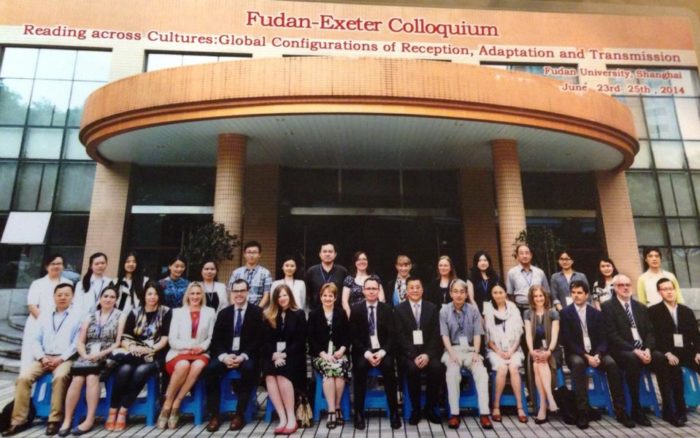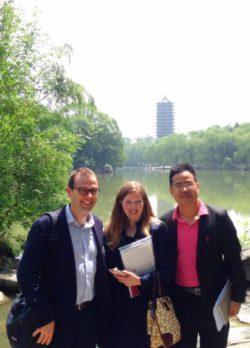Emma Cayley’s passion for language and experience of China and Chinese

Professor Emma Cayley, Head of the School of Languages, Cultures and Societies (LCS) at the University of Leeds, has always been a people person and enjoys languages. She studied some Mandarin after taking trips to China for work and has seen how knowing even a little Mandarin can help with building relationships at a personal, departmental and university level.
As Head of LCS, which offers 18 languages at various levels and is the home of the first modern Chinese Studies section in the UK, being a passionate advocate for language-learning is part of Emma Cayley’s job.
Of course, her passion for languages goes much deeper than that. Having studied Latin, Ancient Greek and Medieval French she clearly loves language for its own sake, but she also sees it as a tool for making connections and opening up the world. Emma remembers reading other literatures in translation aged 13 and daydreaming about experiencing the different cultures described in her books.

In Zhouzhuang Water Town outside Shanghai. For Emma the double bridges in Zhouzhuang symbolised building relationships with China.
It therefore isn’t surprising that when she began taking trips to China for work, Emma decided to study Mandarin Chinese. Read on to learn how she fell in love with Chinese language and culture, and to find out what benefits even her basic conversational Chinese has given her in her personal and professional life.
We also spoke to Emma about the skills language learners develop through their studies, and the powerful contribution language skills can make to creating a sense of belonging for all.
Emma’s first experiences of China and Chinese
In 2011 Emma became Head of Department at her previous university (Exeter) and had the opportunity to travel to China multiple times to build relationships with Chinese universities. She was involved in establishing a Chinese undergraduate course at Exeter - a proud achievement.
On her trips to China Emma fell in love with the language and culture; drawn to the “glamour” of the written characters and finding herself “desperate to understand what people were saying.” After her second trip Emma enrolled on a Beginner’s Chinese course in Exeter.

International Colloquium with Fudan and Exeter Universities at Fudan in June 2014.
The goal was never to become completely proficient in Chinese, but to address the sense of frustration she felt when their “very kind and generous hosts” had to keep talking to them in English, and to show respect through an effort to learn some of their language.
Emma remembers what it’s like being in China without understanding a word, wondering if she would get lost trying to get the subway by herself. She knows what it’s like learning Chinese as a beginner, when everything seems like an unbroken stream of sounds.
Chinese learning breakthroughs

By Weiming Lake on PKU campus in Beijing with Professor Dong Qiang of the French Department and Professor Adam Watt (Exeter), 2015
This effort Emma put in on her course immediately paid off on her next trip, when introducing herself in Mandarin elicited an immediate warm response from her Chinese hosts.
As her confidence grew other milestones included the first time she took the subway on her own; buying the correct ticket and getting off at the right stop.
Negotiating public transport on my own felt like a big deal.
With her knowledge of numbers and basic phrases she was able to ask a taxi driver to take her to Shanghai’s 1933 Slaughterhouse – when he understood where she wanted to go and took her there it felt like “a major victory!”
Gradually, after a few more trips to China, things started to fall into place and the impenetrable stream of sounds became distinguishable words. The formal learning she had done in class gave Emma a foundation, leaving her with the sense that if she had more vocabulary to add to the structures she knew, maybe she could actually master having conversations!

On the Bund in Shanghai in 2016 with Professor Lu Li'An (Fudan University) and Professor Regenia Gagnier (Exeter)
The reality of taking Chinese classes
Finding time
It’s a treat I give myself because I love languages.
Emma recognises that it is quite difficult to find a regular slot every week where you’re going to be free, and that attending classes requires motivation. As someone with a well-established interest in languages she is able to tap into her intrinsic enjoyment of the process and view a Chinese class as something she does for herself: “I view it as someone else might view going to a yoga class”
Being a beginner again
Reflecting on the experience of being a beginner again as an adult and as someone in a leadership role, Emma agrees that “it does feel strange”, but highlights the benefits too.
For any teacher, and particularly a lecturer in languages, going back to basics helps you to identify with your students and put yourself in their shoes.
It’s a humbling experience actually, which I think is quite valuable, personally and professionally.
Going back to the stage where you don’t know anything and struggle to understand also reminds you how “incredibly impressive” it is for students to reach a high level in Chinese.
The power of language
"If you talk to a man in a language he understands, that goes to his head. If you talk to him in his language, that goes to his heart." Nelson Mandela
Emma highlights the high percentage of students from China studying at the University of Leeds, including a large number in her school (LCS), and how powerful it can be to learn even a little bit about the language and culture.
One of the things that really makes students feel like they belong is to feel that somebody has made a bit of an effort to understand a little bit about not only their circumstances as students but actually their own language.
"Making that little effort is really beneficial to building relationships with students and making them feel a bit more welcome."
The value of a degree in languages
It’s like you suddenly understand the world in colour, not in black and white.
Emma encourages students to recognise the full range of skills they develop on their language degree, as these are transferrable and valuable even in roles that don’t directly use the language.
Cultural awareness
An understanding of other cultures is hugely important in today’s globalised world – “it’s almost a social responsibility to be able to understand people’s different motivations.”
Flexibility
Languages enable a flexibility of mind, for example when you realise that there may be five or even ten translations for one particular word! This means that linguists really understand that “there are always nuances, there are always different options and ways to conceive of things”, which makes them open and flexible.
Emma believes this flexibility and open-mindedness is valuable in any profession and is something that makes linguists very employable.
They don’t just see the one solution, they see multiple solutions or pathways to a solution.
Resilience
Learning a language demonstrates that you have the discipline to persevere with something difficult.
You’ve got to be pretty determined because it ain’t easy!
Emma respects the decision to choose a language like Chinese with a reputation for being more difficult: “there’s that extra bit of linguist in you who really wants to go the extra mile… Mandarin is one of those that requires just an extra degree of commitment and determination.”
Interdisciplinary knowledge
People who don’t study languages may not realise the full range of subjects that a languages degree can cover. Students of Chinese can learn about Chinese literature, society, politics, history, linguistics, film – “a vast array of non-linguistic skills that you pick up in the course of doing a degree.”
Emma points out, for example, that a student interested in literature may graduate with particularly well-honed analytical skills developed through this aspect of their studies.
Your module selection can lead you down a particular path and towards a certain area of specialisation alongside language – for Emma this was medieval studies.
Putting it all together
The knowledge of Chinese culture, etiquette and belief systems that Emma developed through trips to China and Mandarin classes have helped her to build rapport and feel more confident interacting with Chinese students and staff in her current and previous roles.

Lunch with the Director of International Affairs in Shanghai
In China this might mean exchanging business cards with two hands, or knowing how to act at the dinner table and where to put your chopsticks. Emma felt more comfortable approaching students at alumni events, trying out some of her Mandarin and exchanging WeChat contact details – “it really did help just to have that little smattering of Chinese, I think that was appreciated.”
Wearing Chinese brooches or scarves is one way Emma tries to show respect and appreciation for the culture. She would make a particular effort to wear red and “everyone would always comment on it and say it was lucky.”
Emma loves leading a School with such a variety of languages on offer, including a well-established and respected Chinese programme. She is looking forward to visiting China again and developing relationships in her role as Head of LCS at Leeds.
Explore further
- Find out more about the School of Languages, Cultures and Societies and the East Asian Studies Department.
- Read more about the skills Mandarin learners develop in this post about the top five skills employers want.
- Learn more about Business Confucius Institute Chinese courses.
- Sign up for our mailing list and select 'Mandarin Aspirations' to be notified when new blog posts are published.
